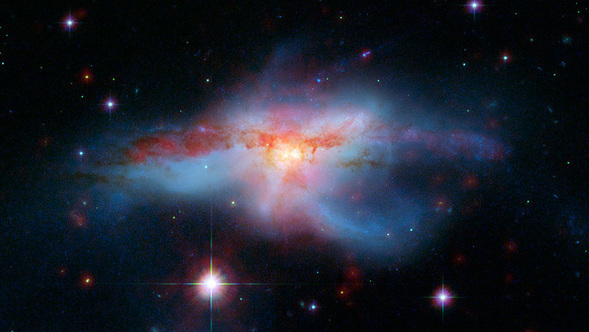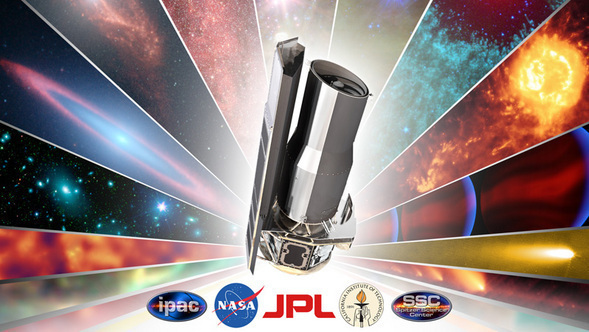I am a postdoctoral researcher at the Spitzer Science Center and I work on galaxies and understanding their properties. My main research at the moment is on compact groups of galaxies, like Stephan's Quintet. As the galaxies move past each other they get tugged and pulled and lose stars and gas. It's very traumatic for the galaxies and they change and coalesce over time, eventually becoming more like one big, messy galaxy. Stephan's Quintet is very dramatic because at the moment one galaxy is colliding with the rest of the group and this has caused a huge shock wave (like a sonic boom) to move through the group. I am very interested in the effect this is having on the galaxies and what it tells us about similar groups that are in the process of merging. This physics also has applications to many key areas in astronomy.
I also work on a very weird galaxy I studied for my PhD. This galaxy is hidden behind the Milky Way and has a massive gas disk, one of the biggest ever discovered, but unlike other galaxies with so much gas, this one is making lots and lots of stars and building a stellar disk. Learning more about this galaxy will teach us more about how galaxies form and grow, which was particularly important when the universe was younger and making lots of galaxies.
So how did I end up being an astronomer? I grew up in Cape Town and was introduced to astronomy (and science in general) by my Dad, a paleontologist at the Natural History Museum in Cape Town. My dad built his own telescope and from our backyard we would admire the beautiful southern sky. I distinctly remember being woken up in the early hours of the morning to see Halley's Comet in 1986, and my Dad emphasising the significance of this event. In high school I started working part-time at the Cape Town Planetarium, something I would do for the next 15 years and which would, ultimately, bring me back to astronomy.
At the University of Cape Town I specialized in Physics and after graduating I worked in the private sector for several years. In the meantime astronomy had become a fast growing science in South Africa and I was offered an opportunity to follow a dream. And so, I went back to university and began my graduate work in astrophysics.
I first visited Caltech and the Spitzer Science Center on an IPAC Graduate Student Fellowship in 2007. I found it to be such a stimulating and exciting place to work I really wanted to come back. I started my postdoc in November 2008 and am looking forward to doing lots of great science while I'm here.

I am a postdoctoral researcher at the Spitzer Science Center and I work on galaxies and understanding their properties. My main research at the moment is on compact groups of galaxies, like Stephan's Quintet. As the galaxies move past each other they get tugged and pulled and lose stars and gas. It's very traumatic for the galaxies and they change and coalesce over time, eventually becoming more like one big, messy galaxy. Stephan's Quintet is very dramatic because at the moment one galaxy is colliding with the rest of the group and this has caused a huge shock wave (like a sonic boom) to move through the group. I am very interested in the effect this is having on the galaxies and what it tells us about similar groups that are in the process of merging. This physics also has applications to many key areas in astronomy.
I also work on a very weird galaxy I studied for my PhD. This galaxy is hidden behind the Milky Way and has a massive gas disk, one of the biggest ever discovered, but unlike other galaxies with so much gas, this one is making lots and lots of stars and building a stellar disk. Learning more about this galaxy will teach us more about how galaxies form and grow, which was particularly important when the universe was younger and making lots of galaxies.
So how did I end up being an astronomer? I grew up in Cape Town and was introduced to astronomy (and science in general) by my Dad, a paleontologist at the Natural History Museum in Cape Town. My dad built his own telescope and from our backyard we would admire the beautiful southern sky. I distinctly remember being woken up in the early hours of the morning to see Halley's Comet in 1986, and my Dad emphasising the significance of this event. In high school I started working part-time at the Cape Town Planetarium, something I would do for the next 15 years and which would, ultimately, bring me back to astronomy.
At the University of Cape Town I specialized in Physics and after graduating I worked in the private sector for several years. In the meantime astronomy had become a fast growing science in South Africa and I was offered an opportunity to follow a dream. And so, I went back to university and began my graduate work in astrophysics.
I first visited Caltech and the Spitzer Science Center on an IPAC Graduate Student Fellowship in 2007. I found it to be such a stimulating and exciting place to work I really wanted to come back. I started my postdoc in November 2008 and am looking forward to doing lots of great science while I'm here.





